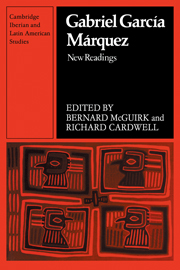Book contents
- Frontmatter
- Contents
- Note on the translations
- List of contributors
- Introduction
- 1 Characterization in the early fiction of Gabriel García Márquez
- 2 Beware of gift-bearing tales: reading ‘Baltazar's Prodigious Afternoon’ according to Marcel Mauss
- 3 The body as political instrument: communication in No One Writes to the Colonel
- 4 Magical realism and the theme of incest in One Hundred Years of Solitude
- 5 Translation and genealogy: One Hundred Years of Solitude
- 6 The humour of One Hundred Years of Solitude
- 7 On ‘magical’ and social realism in García Márquez
- 8 Aspects of narrative structure in The Incredible and Sad Story of the Innocent Eréndira and her Heartless Grandmother
- 9 Language and power in The Autumn of the Patriarch
- 10 Writing and ritual in Chronicle of a Death Foretold
- 11 Free-play of fore-play: the fiction of non-consummation: speculations on Chronicle of a Death Foretold
- 12 A prospective post-script : apropos of Love in the Times of Cholera
- The solitude of Latin America: Nobel address 1982
- Select bibliography
- Index
5 - Translation and genealogy: One Hundred Years of Solitude
Published online by Cambridge University Press: 05 November 2011
- Frontmatter
- Contents
- Note on the translations
- List of contributors
- Introduction
- 1 Characterization in the early fiction of Gabriel García Márquez
- 2 Beware of gift-bearing tales: reading ‘Baltazar's Prodigious Afternoon’ according to Marcel Mauss
- 3 The body as political instrument: communication in No One Writes to the Colonel
- 4 Magical realism and the theme of incest in One Hundred Years of Solitude
- 5 Translation and genealogy: One Hundred Years of Solitude
- 6 The humour of One Hundred Years of Solitude
- 7 On ‘magical’ and social realism in García Márquez
- 8 Aspects of narrative structure in The Incredible and Sad Story of the Innocent Eréndira and her Heartless Grandmother
- 9 Language and power in The Autumn of the Patriarch
- 10 Writing and ritual in Chronicle of a Death Foretold
- 11 Free-play of fore-play: the fiction of non-consummation: speculations on Chronicle of a Death Foretold
- 12 A prospective post-script : apropos of Love in the Times of Cholera
- The solitude of Latin America: Nobel address 1982
- Select bibliography
- Index
Summary
The concept of the definitive text belongs only to religion or to exhaustion.
(Borges, ‘The Homeric Versions’, 1932)Cela [l'histoire du Babel] inscrit la scène de la traduction dans un espace qui est justement celui de la généalogie des noms propres, de la famille, de l'endettement, de la loi, à l'interieur d'une scène d'héritage.
(Derrida, L'oreille de l'autre, 1982)One of the many fundamental issues addressed in One Hundred Years of Solitude is that of translation, and of translation's links with the writing of this particular novel as well as with the novel as a genre. Few critics have failed to observe, of course, that the action in One Hundred Years of Solitude is inextricably linked to the process of decoding Melquíades's prophetic manuscript, and that such a decoding involves a translation; but the interpretation of this aspect of the novel has tended to revolve around theories of reading and more general questions about the nature of writing, so that little attention has been paid to the implications of the act of translation itself. Yet, a consideration of what translation implies in the context of One Hundred Years of Solitude can provide us not only with insights into this contemporary Latin American classic but also into the role of translation in literary history and in the constitution of the novel as a genre.
- Type
- Chapter
- Information
- Gabriel García MárquezNew Readings, pp. 65 - 80Publisher: Cambridge University PressPrint publication year: 1987
- 2
- Cited by

